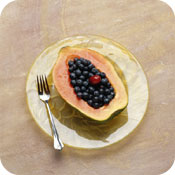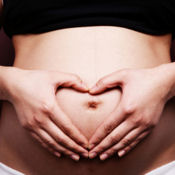
Like all expectant mothers, vegetarians need to pay close attention to the foods they eat and the nutrients those foods contain. This need is a constant, and does not change because of a lifestyle choice.
"What you consume when you are pregnant matters more because you are not only taking care of your own body, but you are starting the beginnings of a new one," says Dr. Amy Lanou, Nutritional Director for the Physicians Committee for Responsible Medicine. "The nutrients of special importance during pregnancy don't vary depending on what your diet is, they remain important."
Nutritional Considerations
Calcium is crucial to the development of bones and teeth. Even if a woman has an insufficient calcium intake, the baby will still get what it needs from the mother's body. Therefore to ensure her bone health, vegetarian and especially vegan women should be sure to consume calcium rich foods like kale, collards, broccoli, cabbage, legumes, enriched soy and rice milks, calcium fortified orange juice and breakfast cereals.
Folate or folic acid is instrumental in neural development. Vegetarians have a tendency to have a higher folate intake than do omnivorous people, because their diet often includes folate rich foods such as dark green leafy vegetables and legumes. If a woman is concerned about her folate consumption, she can always take a supplement.
Iron is needed to make hemoglobin for both mother and child. During pregnancy, iron supplements are commonly recommended in addition to iron-rich foods such as whole and enriched grains, legumes, soy products, nuts, seeds, dried fruits, and
vegetables.
Protein aids in the production of new cells. The second and third trimesters of pregnancy call for an additional 25 grams of protein daily, but most vegetarian diets include this much. It is a common misconception that vegetarians have to struggle to consume enough protein. The fact of the matter is that a well-planned vegetarian diet, which includes a variety of plant-based proteins, will meet most women's needs. You can get it from tofu, meat analogs (such as vegetarian burgers or meat substitutes), edamame, all types of beans (black, pinto, garbanzo, kidney, etc.), lentils, and split peas. You'll also find some protein in whole grains, dairy products (like milk and yogurt), soymilk, nuts and nut butters.
Vitamin B-12 plays an important role in fetal brain development, normal cell growth and protein synthesis. While not a lot of B-12 is needed, vegans need to pay special attention to this need. Omnivorous or vegetarian people usually meet their B-12 requirement because it is rather ubiquitous in animal based foods, but vegans don't have a dietary source of vitamin B-12. For these women, enriched or fortified soy or rice milk, nutritional yeast, and supplements are the best sources of B-12.
Continued ›
| 






Member Comments